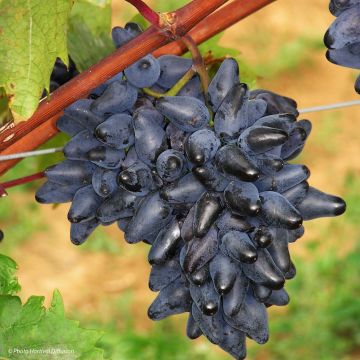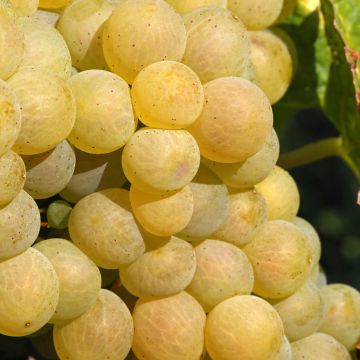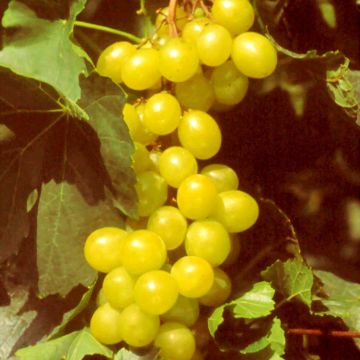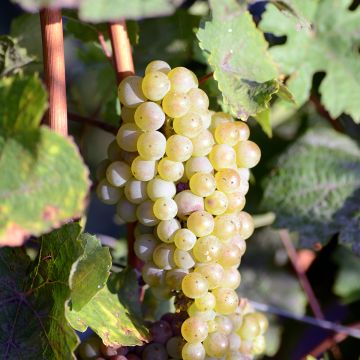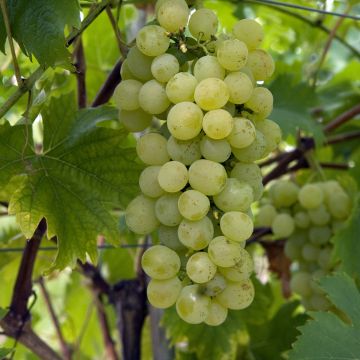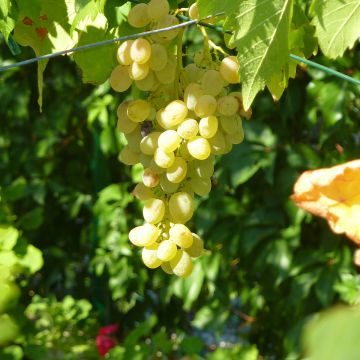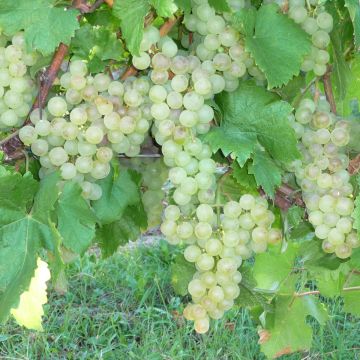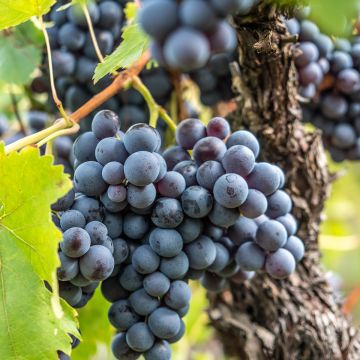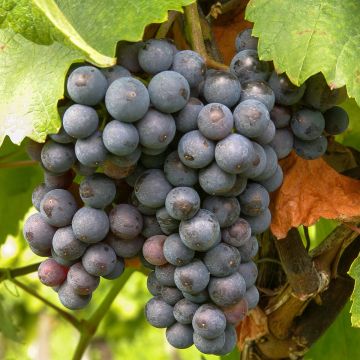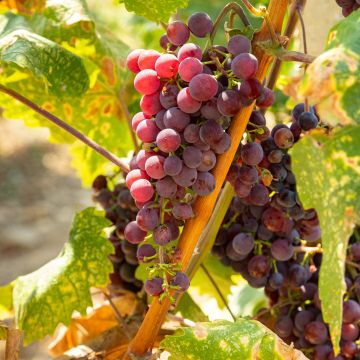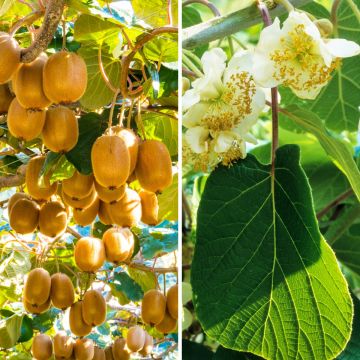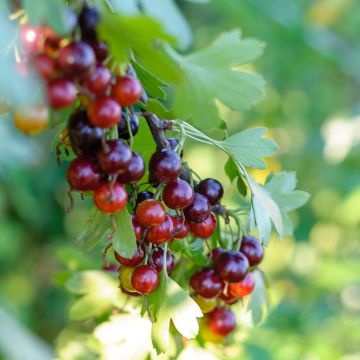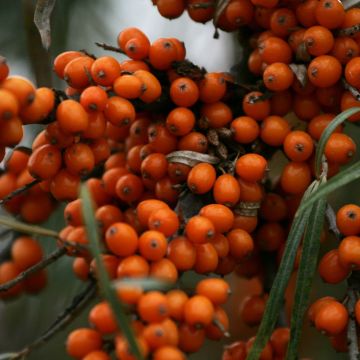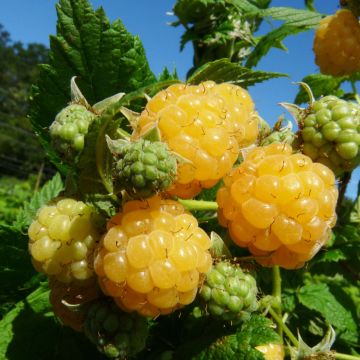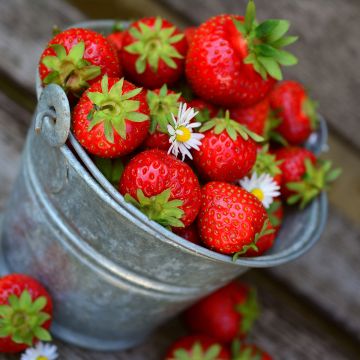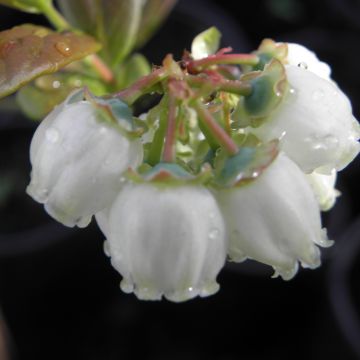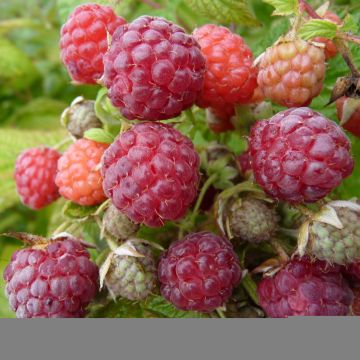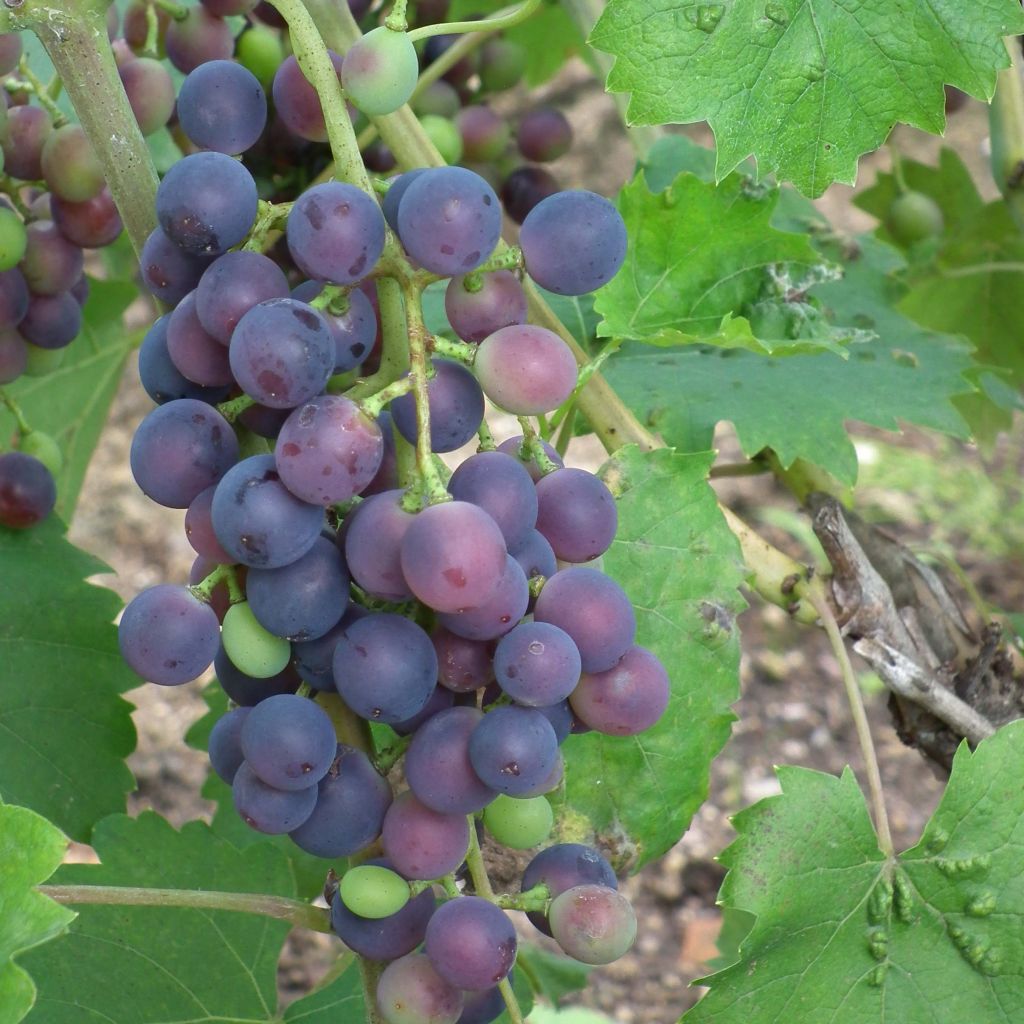

Vitis vinifera Muscat Bleu - Grape vine
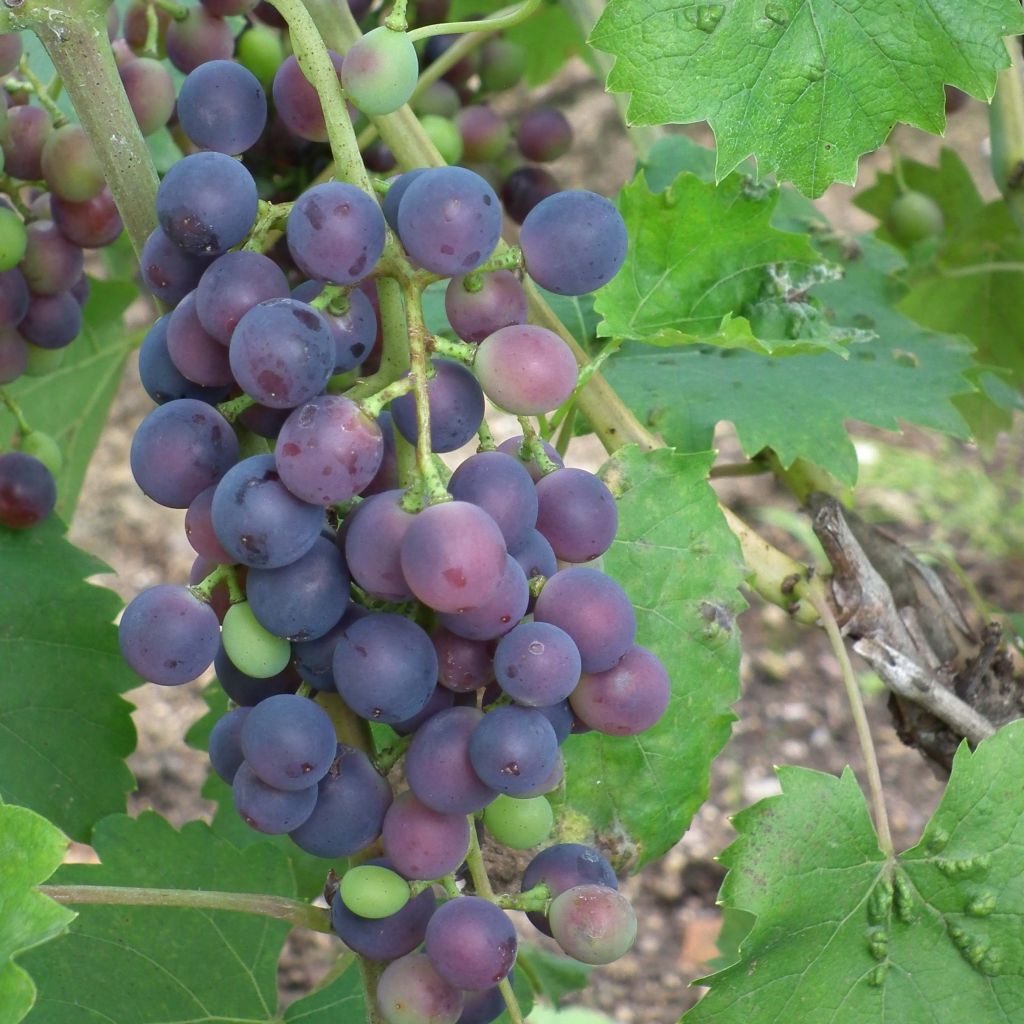

Vitis vinifera Muscat Bleu - Grape vine
Vitis vinifera Muscat Bleu - Grape vine
Vitis vinifera Muscat Bleu ZPd4
Common Grape Vine, European Grape, Wine Grape
The plant arrived in good health. It quickly settled in and has already produced several small clusters of very sweet juice.
Maëva, 16/09/2025
Special offer!
Receive a €20 voucher for any order over €90 (excluding delivery costs, credit notes, and plastic-free options)!
1- Add your favorite plants to your cart.
2- Once you have reached €90, confirm your order (you can even choose the delivery date!).
3- As soon as your order is shipped, you will receive an email containing your voucher code, valid for 3 months (90 days).
Your voucher is unique and can only be used once, for any order with a minimum value of €20, excluding delivery costs.
Can be combined with other current offers, non-divisible and non-refundable.
Home or relay delivery (depending on size and destination)
Schedule delivery date,
and select date in basket
This plant carries a 6 months recovery warranty
More information
We guarantee the quality of our plants for a full growing cycle, and will replace at our expense any plant that fails to recover under normal climatic and planting conditions.
Description
The 'Muscat Bleu' grape is a variety of table and wine vine, originating from Switzerland. It is a self-fertile variety, with blue-black berries, whose juicy flesh is very sweet, with a slight muscat flavour. This moderately vigorous vine reaches a height of 3m (10ft) and a width of 2m (7ft). Hardy and resistant to common vine diseases, it is particularly unaffected by powdery mildew and grey rot, and relatively resistant to downy mildew, which is a definite advantage for garden cultivation. It is moderately demanding and grows well in ordinary but sufficiently fertile, well-drained soil, in full sun.
The wine grape vine (Vitis vinifera) grew wild over 5000 years ago in North and Central America, Europe, and Central and Eastern Asia. The wild subspecies, sylvestris, still exists and is a climbing vine that grows on the edge of forests and can reach great heights in trees. It was introduced for cultivation in France by the Phocaeans in Provence around 600 BC. The current varieties, called grape varieties in the case of the vine, are linked to the vinifera subspecies (although there are other cultivated species, but they are very minor). Economically, wine grapes dominate table grapes, with over 200 authorized grape varieties in France, the result of centuries of selection work.
The 'Muscat Bleu' is a fairly old hybrid, obtained in Switzerland in 1930 by breeder Charles Garnier in Geneva. This variety is the result of a cross between 15/6 'Garnier' (itself descended from 'Villard noir' and 'Müller-Thurgau') and 'Perle Noire'. This 'Muscat Bleu' is an interspecific hybrid, incorporating genes from 4 species of vine: Vitis vinifera (our "classic" vine), Vitis lambrusca (the American Raspberry Vine), Vitis rupestris (a small American vine), and Vitis aestivalis var. lincecumii (an American and Canadian vine). This variety, with its complex genetics, has many advantages. It is of moderate vigor, reaching a height of 3m (10ft). This self-fertile variety is quite recognizable by its entire or 3-lobed leaves, which are almost round in shape and have very pronounced toothed edges. This vine is used for wine, table grapes, and even as an ornamental plant. Its flowering in May-June, depending on the region, produces medium to large, conical, and fairly open clusters of fruits. In September, the round or slightly elliptical berries reach ripeness. They have a beautiful blue-black colour, medium size, with a moderately thick skin. Their firm and juicy flesh is well flavoured, with a slight muscat taste. Unfortunately, this variety is prone to coulure and millerandage (abortion of flowers resulting in drops before ripening, and clusters consisting of grapes of different sizes and ripeness), this variety has a moderate yield and its productivity can be irregular. However, it is highly resistant to two serious diseases, powdery mildew and botrytis (grey rot), and fairly resistant to downy mildew. This makes it a very interesting variety for enthusiasts.
Being hardy (down to -20°C (-4°F) or even -25°C (-13°F)), this vine grows in full sun, in neutral to slightly acidic, well-drained soil. This variety prefers deep and fertile soils, being more demanding than many other varieties adapted to frugality. Keep this in mind when planting by enriching the planting hole with good organic amendment. Also, apply organic fertilizer every year after harvest to store nutrients for winter. Your vine will use them to restart well in the following spring.
The 'Muscat Bleu' grape is a great choice for the garden thanks to its good disease resistance. Its moderate vigor also makes it easy to cultivate, especially on a trellis. You will enjoy its delicious sweet berries. In general, grapes are rich in B vitamins, a source of fibre and manganese, and they are also rich in antioxidants. They are believed to play a role in preventing cardiovascular diseases, and above all, they are a healthy, natural, and tasty dessert. To enjoy different flavours, plant a white grape variety like the Vigne 'Pied de Perdrix' with its equally sweet pulp. Or the Thornless 'Jumbo' Blackberry, which you can enjoy fresh or cooked in desserts or jellies.
Report an error about the product description
Vitis vinifera Muscat Bleu - Grape vine in pictures
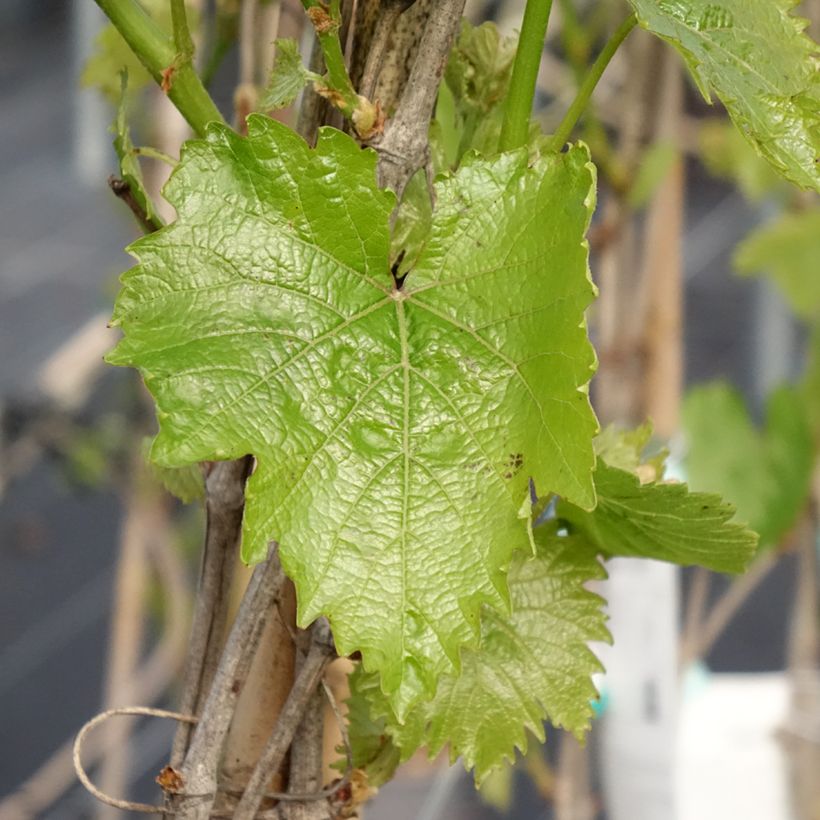

Plant habit
Fruit
Flowering
Foliage
Botanical data
Vitis
vinifera
Muscat Bleu ZPd4
Vitaceae
Common Grape Vine, European Grape, Wine Grape
Cultivar or hybrid
Other Grapevines
View all →Planting and care
Since the ravages of phylloxera at the end of the 19th century, the vine is obligatorily grafted onto different resistant rootstocks to this disease and adapted to different types of soil. These rootstocks come from American varieties naturally armed against this formidable parasite itself of American origin.
Plant the 'Muscat Bleu' vine in autumn, in a deep, well-drained soil, even stony, clayey and limestone, knowing that the vine is not demanding in terms of the chemical nature of the soil. It is capable of adjusting to moderately acidic soil (up to pH 6 approximately because below this, assimilation of certain trace elements is blocked), neutral and limestone up to pH 8.5 approximately (knowing that in this case, it is actually the excess of active limestone that is detrimental). This Muscat gives better results in sufficiently fertile soil, not too poor.
Plant it in a sunny location, sheltered from strong, cold and dry winds. This variety withstands frost in winter, it is hardy down to -20°C/-25°C (-13°F). Incorporate 3 or 4 handfuls of fertilizer for fruit trees and 2kg of composted manure for each vine into the planting soil. Be careful, the roots should not come into contact with the manure. After planting, prune above 2 large buds to obtain the growth of two shoots. Keep the most vigorous one and tie it to a stake. This will be followed by training pruning.
The vine does not require regular fertilizer application, quite the opposite for good yield. In soil that is too rich, vegetation (leaves) will develop at the expense of fruiting. Enrich the soil with potash slag, crushed horn or iron chelate, only every 2-3 years.
This vine is very resistant to powdery mildew and grey rot (botrytis), and relatively resistant to downy mildew. However, it can be prone to coulure (drop of young berries) and millerandage (berries of different size and ripeness on the same cluster).
Planting period
Intended location
Care
-
, onOrder confirmed
Reply from on Promesse de fleurs
Similar products
Haven't found what you were looking for?
Hardiness is the lowest winter temperature a plant can endure without suffering serious damage or even dying. However, hardiness is affected by location (a sheltered area, such as a patio), protection (winter cover) and soil type (hardiness is improved by well-drained soil).

Photo Sharing Terms & Conditions
In order to encourage gardeners to interact and share their experiences, Promesse de fleurs offers various media enabling content to be uploaded onto its Site - in particular via the ‘Photo sharing’ module.
The User agrees to refrain from:
- Posting any content that is illegal, prejudicial, insulting, racist, inciteful to hatred, revisionist, contrary to public decency, that infringes on privacy or on the privacy rights of third parties, in particular the publicity rights of persons and goods, intellectual property rights, or the right to privacy.
- Submitting content on behalf of a third party;
- Impersonate the identity of a third party and/or publish any personal information about a third party;
In general, the User undertakes to refrain from any unethical behaviour.
All Content (in particular text, comments, files, images, photos, videos, creative works, etc.), which may be subject to property or intellectual property rights, image or other private rights, shall remain the property of the User, subject to the limited rights granted by the terms of the licence granted by Promesse de fleurs as stated below. Users are at liberty to publish or not to publish such Content on the Site, notably via the ‘Photo Sharing’ facility, and accept that this Content shall be made public and freely accessible, notably on the Internet.
Users further acknowledge, undertake to have ,and guarantee that they hold all necessary rights and permissions to publish such material on the Site, in particular with regard to the legislation in force pertaining to any privacy, property, intellectual property, image, or contractual rights, or rights of any other nature. By publishing such Content on the Site, Users acknowledge accepting full liability as publishers of the Content within the meaning of the law, and grant Promesse de fleurs, free of charge, an inclusive, worldwide licence for the said Content for the entire duration of its publication, including all reproduction, representation, up/downloading, displaying, performing, transmission, and storage rights.
Users also grant permission for their name to be linked to the Content and accept that this link may not always be made available.
By engaging in posting material, Users consent to their Content becoming automatically accessible on the Internet, in particular on other sites and/or blogs and/or web pages of the Promesse de fleurs site, including in particular social pages and the Promesse de fleurs catalogue.
Users may secure the removal of entrusted content free of charge by issuing a simple request via our contact form.
The flowering period indicated on our website applies to countries and regions located in USDA zone 8 (France, the United Kingdom, Ireland, the Netherlands, etc.)
It will vary according to where you live:
- In zones 9 to 10 (Italy, Spain, Greece, etc.), flowering will occur about 2 to 4 weeks earlier.
- In zones 6 to 7 (Germany, Poland, Slovenia, and lower mountainous regions), flowering will be delayed by 2 to 3 weeks.
- In zone 5 (Central Europe, Scandinavia), blooming will be delayed by 3 to 5 weeks.
In temperate climates, pruning of spring-flowering shrubs (forsythia, spireas, etc.) should be done just after flowering.
Pruning of summer-flowering shrubs (Indian Lilac, Perovskia, etc.) can be done in winter or spring.
In cold regions as well as with frost-sensitive plants, avoid pruning too early when severe frosts may still occur.
The planting period indicated on our website applies to countries and regions located in USDA zone 8 (France, United Kingdom, Ireland, Netherlands).
It will vary according to where you live:
- In Mediterranean zones (Marseille, Madrid, Milan, etc.), autumn and winter are the best planting periods.
- In continental zones (Strasbourg, Munich, Vienna, etc.), delay planting by 2 to 3 weeks in spring and bring it forward by 2 to 4 weeks in autumn.
- In mountainous regions (the Alps, Pyrenees, Carpathians, etc.), it is best to plant in late spring (May-June) or late summer (August-September).
The harvesting period indicated on our website applies to countries and regions in USDA zone 8 (France, England, Ireland, the Netherlands).
In colder areas (Scandinavia, Poland, Austria...) fruit and vegetable harvests are likely to be delayed by 3-4 weeks.
In warmer areas (Italy, Spain, Greece, etc.), harvesting will probably take place earlier, depending on weather conditions.
The sowing periods indicated on our website apply to countries and regions within USDA Zone 8 (France, UK, Ireland, Netherlands).
In colder areas (Scandinavia, Poland, Austria...), delay any outdoor sowing by 3-4 weeks, or sow under glass.
In warmer climes (Italy, Spain, Greece, etc.), bring outdoor sowing forward by a few weeks.






























